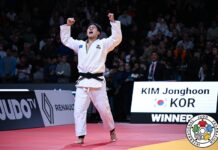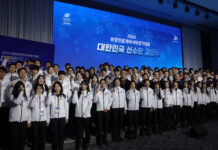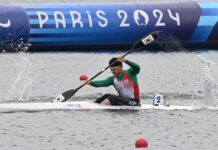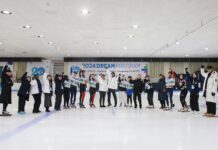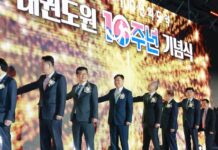
Team Korea cheers as it wins its sled ice hockey match against the Czech Republic, at the Gangneung Hockey Center on March 11.
By Korea.net PyeongChang Special Report Team
Photo = Ministry of Culture, Sports and Tourism
Gangneung | March 14, 2018
People’s perspectives of disabled people vary according to their own circumstances. Perceptions of disabled people perceived through the eyes of complete strangers, or through the eyes of family or friends, differ greatly. Such varieties of perspectives co-exist in the stadiums of the PyeongChang 2018 Paralympic Winter Games.
On March 11, the day of the men’s para ice hockey match between Korea and the Czech Republic, all the tickets were sold out and the stadium was packed. The athletes’ intense movements, dull thuds, and the cheering of the crowds were the same as at last month’s Olympic Games, but it was different from the passionate atmosphere of Olympics.
Lee Kyu Sung, who couldn’t get a ticket to the Olympic Games, came for the Paralympics instead. He said, “I felt sorry when a disabled athlete fell and couldn’t get up easily. Throughout my life, I never really had many opportunities to meet disabled people, so it’s difficult for me to avoid seeing them with pity.”
On the other side of the stadium, the audience had flushed and concerned faces.
Those who held up signs and Taegeukgi flag in both hands, being fully immersed in the game, were the athletes’ family members. The families cheered for every action the athletes made, and as soon as the game was over, they rushed down to greet the athletes.
Song Gyung Soon, mother of the para ice hockey player Lee Jae Woong, said, “I’m just glad that the game finished without any injuries.” She smiled as she showed how proud she was of her son who never gave up after his tough childhood of being bullied for his disability. Choi Min Hee, the wife of para ice hockey player Lee Jong Kyung, also praised the athletes. “It’s already special and meaningful that they have lived with positive minds.”
However, the interviewers with the athletes noted that exaggerated praise could become a burden on the athletes.
Yu Man Gyun, who had an interview right before the game, emphasized that, “What we want isn’t sympathy or a heroic tale of overcoming difficulties. All we want is just to be treated normally.”
It was a solemn fact that different perspectives on the disabled existed in the stadium.
However, we shouldn’t forcibly try to unify different perspectives that coexist, since it’s not easy to understand without experience. Still, changes can occur through efforts to be interested in each other’s perspectives and by being together in one place, such as in the stadium. Everyone has little cuts or bruises on their elbows and knees when they slip and tumble, and a disability should also be naturally accepted in a person’s life.
Hopefully, the PyeongChang 2018 Paralympic Winter Games offer the time and space for different perspectives to narrow down toward one direction.
eykim86@korea.kr



